Hexagramme 23 du Yi Jing - Trait 6
L'hexagramme : 23
Un hexagramme est une combinaison de six traits yin et yang.

23.6 (23 > 2) - THE PO HEXAGRAM
The topmost line, undivided, shows its subject (as) a great fruit which has not been eaten. The superior man finds (the people again) as a chariot carrying him. The small men (by their course) overthrow their own dwellings.
Bing DeepL Google Yandex23.6 (23 > 2) - Choosing to leave
One accepts the rupture. One will obtain supports and means of action.
Bing DeepL Google Yandex23.6 (23 > 2) - Choosing to leave
One accepts the rupture. One will obtain supports and means of action.
Bing DeepL Google Yandex23.6 (23 > 2) - Poh, l’écroulement
Poh : opprimer, renverser, traiter durement.
Fruit tout formé qu’on ne mange pas (bien acquis qui se détruit). Le sage, l’homme supérieur conquiert la terre (ou acquiert un char, le peuple qui le porte sur ses bras) ; l’homme bas et vulgaire fait crouler (poh) jusqu’à sa demeure (le fruit formé qu’il ne peut manger).
Il ne pourra plus en user.
23.6 (23 > 2) - Préférer partir
On accepte la rupture. On obtiendra des soutiens et des moyens d'action.
Bing DeepL Google Yandex23.6 (23 > 2) - Lepusztulás
Elfogadja a veszteséget. Támogatást és lehetőséget kap.
Bing DeepL Google YandexLes trigrammes
Les trigrammes sont des combinaisons de trois traits yin et yang. Dans l'hexagramme, les trois traits du dessous constituent le trigramme inférieur et représentent la situation intérieure. Les trois lignes du haut constituent le trigramme supérieur et représentent la situation extérieure.
trigSup2


trigInf

L'hexagramme nucléaire : 2
L'hexagramme nucléaire est l'association des deux trigrammes intérieurs (traits 2,3,4 et 3,4,5). Il représente la racine, ou l'origine de la situation.

2 - THE KHWĂN HEXAGRAM
Khwăn (represents) what is great and originating, penetrating, advantageous, correct and having the firmness of a mare. When the superior man (here intended) has to make any movement, if he take the initiative, he will go astray ; if he follow, he will find his (proper) lord. The advantageousness will be seen in his getting friends in the south-west, and losing friends in the north-east. If he rest in correctness and firmness, there will be good fortune.
Bing DeepL Google Yandex2 - Kwūn, la réceptivité
Kwūn : a) Principe passif, réceptif. 1. Terre étendue et portant ; 2. Femme, femelle ; 3. Soumission, complaisance ; 4. Support, appui. — b) Kwun, fermer, lier. c) Kwun : vêtement impérial.
Texte
Kwùn : Terre recevant l’action du principe actif et portant, produisant ; femelle portant et produisant, concourant à la série des quatre actes de la vie des êtres. Le grand, en ce qu’il fait, ne doit point prévenir l’action des forces naturelles ; s’il le fait, il échouera ; s’il agit après et la suit, il réussira. S’il met son propre avantage au-dessus de tout, il pourra acquérir des amis d’un côté, mais il les perdra de l’autre. S’il cherche la paix, la concorde de toutes les puissances, il réussira et sera heureux.
Symbolisme
Le double trigramme de la terre, la terre partout, indique la vertu caractéristique de celle-ci : supporter, entretenir tout. Le sage s’y conformant, entretient et contient tous les êtres par sa vaste vertu.
Commentaire
Suprême est le principe passif de la terre, tous les êtres en reçoivent leur naissance, mais il est complètement soumis au principe actif du ciel. La terre en son amplitude porte toutes choses ; sa vertu est sans limite comme (celle du ciel). Contenant immense, son éclat est grand. Tous les êtres s’y développent ensemble. L’animal femelle (la jument) a la nature de la terre ; elle la parcourt sans terme ni fin. Douceur et soumission (qui sont ses qualités) prouvent le bonheur ; le sage doit les pratiquer. Le bien résultant de la fermeté paisible et durable correspond à l’immense vertu de la terre. (La jument est passive et active comme la terre qui reçoit et produit.)
Le dérivé (Fan Yao) : 2.6
Le même trait sur l'hexagramme après la mutation. Il représente ce qui peut être fait APRÈS pour corriger la situation décrite par ce trait, un peu comme un remède ou une solution.
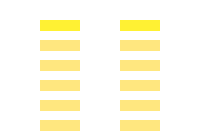
2.6 (2 > 23) - THE KHWĂN HEXAGRAM
The sixth line, divided (shows) dragons fighting in the wild. Their blood is purple and yellow.
Bing DeepL Google Yandex2.6 (2 > 23) - Obedience
Others are surprised because one has acted without concert.
Bing DeepL Google Yandex2.6 (2 > 23) - Obedience
Others are surprised because one has acted without concert.
Bing DeepL Google Yandex2.6 (2 > 23) - Kwūn, la réceptivité
Kwūn : a) Principe passif, réceptif. 1. Terre étendue et portant ; 2. Femme, femelle ; 3. Soumission, complaisance ; 4. Support, appui. — b) Kwun, fermer, lier. c) Kwun : vêtement impérial.
Le dragon combat dans l’espace ; son sang est noirâtre et jaunâtre. (Reprise du koua précédent : le principe actif lutte dans l’immensité pour produire ; il produit le ciel qui est noirâtre et la terre qui est jaunâtre, selon la terminologie chinoise.)
(Cette phrase finale s’applique à la fois aux deux premiers koua.)
2.6 (2 > 23) - L'obéissance
Les autres sont surpris car on a agi sans concertation.
Bing DeepL Google YandexLa jointure: 2.1
Le dérivé du réciproque. Il représente ce qui aurait pu être fait AVANT pour prévenir la situation décrite par ce trait, un peu comme un remède ou une solution.
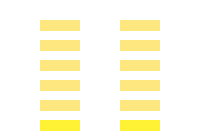
2.1 (2 > 24) - THE KHWĂN HEXAGRAM
In the first line, divided, (we see its subject) treading on hoarfrost. The strong ice will come (by and by).
Bing DeepL Google Yandex2.1 (2 > 24) - Kwūn, la réceptivité
Kwūn : a) Principe passif, réceptif. 1. Terre étendue et portant ; 2. Femme, femelle ; 3. Soumission, complaisance ; 4. Support, appui. — b) Kwun, fermer, lier. c) Kwun : vêtement impérial.
Quand on marche sur le verglas, c’est que la forte gelée arrive à son point extrême.
Cette phrase est une expression consacrée, peignant l’arrivée de l’hiver et le commencement des gelées. D’après la cosmologie chinoise, c’est le moment où le principe passif, réceptif, entre en action, commence à dominer et produit le fort hiver qui est son triomphe. — « Marcher sur le verglas » signifie aussi marcher avec prudence. — Le principe passif va ainsi du verglas à la glace. La forte gelée commençant par un fin verglas est aussi le type du principe producteur terrestre qui commence par l’atome pour produire les plus grands corps. Nous avons donc en cette phrase la plus forte expression du principe Kwūn, objet de la section.
Lorsque le principe passif commence la période de froid, suivant son cours naturel, il en vient aux fortes gelées.
Le réciproque : 24.1
L'hexagramme renversé. Il représente la situation opposée, et en tant que tel est essentiel pour la validation des commentaires.
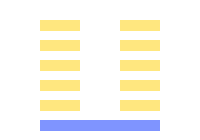
24.1 (24 > 2) - THE FÛ HEXAGRAM.
The first line, undivided, shows its subject returning (from an error) of no great extent, which would not proceed to anything requiring repentance. There will be great good fortune.
Bing DeepL Google Yandex24.1 (24 > 2) - Fû, le retour
Fū : réparation, correction, amendement, retour à l’état originaire
Celui qui s’amende promptement, qui se repent sans résistance sera spécialement heureux. (Ou : le prompt amendement, le repentir sans résistance est suprêmement heureux.)
S’il s’amende et se réforme.
Mutations

23.6 (23 > 2) - THE PO HEXAGRAM
The topmost line, undivided, shows its subject (as) a great fruit which has not been eaten. The superior man finds (the people again) as a chariot carrying him. The small men (by their course) overthrow their own dwellings.
Bing DeepL Google Yandex23.6 (23 > 2) - Choosing to leave
One accepts the rupture. One will obtain supports and means of action.
Bing DeepL Google Yandex23.6 (23 > 2) - Choosing to leave
One accepts the rupture. One will obtain supports and means of action.
Bing DeepL Google Yandex23.6 (23 > 2) - Poh, l’écroulement
Poh : opprimer, renverser, traiter durement.
Fruit tout formé qu’on ne mange pas (bien acquis qui se détruit). Le sage, l’homme supérieur conquiert la terre (ou acquiert un char, le peuple qui le porte sur ses bras) ; l’homme bas et vulgaire fait crouler (poh) jusqu’à sa demeure (le fruit formé qu’il ne peut manger).
Il ne pourra plus en user.
23.6 (23 > 2) - Préférer partir
On accepte la rupture. On obtiendra des soutiens et des moyens d'action.
Bing DeepL Google Yandex23.6 (23 > 2) - Lepusztulás
Elfogadja a veszteséget. Támogatást és lehetőséget kap.
Bing DeepL Google Yandex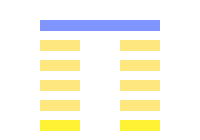
23.1.6 (23 > 24) - THE PO HEXAGRAM
- 1. The first line, divided, shows one overturning the couch by injuring its legs. (The injury will go on to) the destruction of (all) firm correctness, and there will be evil.
- 6. The topmost line, undivided, shows its subject (as) a great fruit which has not been eaten. The superior man finds (the people again) as a chariot carrying him. The small men (by their course) overthrow their own dwellings.
23.1.6 (23 > 24) - Wallowing in the filth
One has lost one's self-respect so one is satisfied with what others didn't want.
Bing DeepL Google Yandex23.1.6 (23 > 24) - Wallowing in the filth
One has lost one's self-respect so one is satisfied with what others didn't want.
Bing DeepL Google Yandex23.1.6 (23 > 24) - Poh, l’écroulement
Poh : opprimer, renverser, traiter durement.
-
1. Poh, « renverser, faire crouler » son lit en en brisant un pied et le détachant ainsi (suites funestes).
C’est le grand, le prince qui se nuit à lui-même en appauvrissant, affaiblissant son peuple. -
6. Fruit tout formé qu’on ne mange pas (bien acquis qui se détruit). Le sage, l’homme supérieur conquiert la terre (ou acquiert un char, le peuple qui le porte sur ses bras) ; l’homme bas et vulgaire fait crouler (poh) jusqu’à sa demeure (le fruit formé qu’il ne peut manger).
Il ne pourra plus en user.
23.1.6 (23 > 24) - Se vautrer dans la fange
On a perdu son amour-propre alors on se contente de ce que les autres n’ont pas voulu.
Bing DeepL Google Yandex23.1.6 (23 > 24) - Lepusztulás
- 1. Nem látja mit veszít.
- 6. Elfogadja a veszteséget. Támogatást és lehetőséget kap.
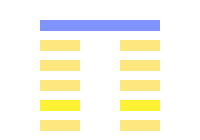
23.2.6 (23 > 7) - THE PO HEXAGRAM
- 2. The second line, divided, shows one overthrowing the couch by injuring its frame. (The injury will go on to) the destruction of (all) firm correctness, and there will be evil.
- 6. The topmost line, undivided, shows its subject (as) a great fruit which has not been eaten. The superior man finds (the people again) as a chariot carrying him. The small men (by their course) overthrow their own dwellings.
23.2.6 (23 > 7) - Not biting
One uses their reputation to avoid the challenge.
Bing DeepL Google Yandex23.2.6 (23 > 7) - Not biting
One uses their reputation to avoid the challenge.
Bing DeepL Google Yandex23.2.6 (23 > 7) - Poh, l’écroulement
Poh : opprimer, renverser, traiter durement.
-
2. [i]Id. (Poh)[i], renverser son lit en en brisant la forme ; ruine, issue destructive. C’est celui qui se perd lui-même en perdant ses auxiliaires ; un roi, ses ministres ; un grand, ses employés et amis. (Dicton.)
Il n’aura pas de compagnons.
C’est la ruine s’étendant, gagnant le haut. -
6. Fruit tout formé qu’on ne mange pas (bien acquis qui se détruit). Le sage, l’homme supérieur conquiert la terre (ou acquiert un char, le peuple qui le porte sur ses bras) ; l’homme bas et vulgaire fait crouler (poh) jusqu’à sa demeure (le fruit formé qu’il ne peut manger).
Il ne pourra plus en user.
23.2.6 (23 > 7) - Ne pas mordre à l'hameçon
On se sert de sa réputation pour ne pas avoir à relever le défi.
Bing DeepL Google Yandex23.2.6 (23 > 7) - Lepusztulás
- 2. Támasz, amire nem lehet számítani többé.
- 6. Elfogadja a veszteséget. Támogatást és lehetőséget kap.
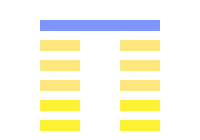
23.1.2.6 (23 > 19) - THE PO HEXAGRAM
- 1. The first line, divided, shows one overturning the couch by injuring its legs. (The injury will go on to) the destruction of (all) firm correctness, and there will be evil.
- 2. The second line, divided, shows one overthrowing the couch by injuring its frame. (The injury will go on to) the destruction of (all) firm correctness, and there will be evil.
- 6. The topmost line, undivided, shows its subject (as) a great fruit which has not been eaten. The superior man finds (the people again) as a chariot carrying him. The small men (by their course) overthrow their own dwellings.
23.1.2.6 (23 > 19) - Playing dead
One copies one's behaviour on that of less lively people.
Bing DeepL Google Yandex23.1.2.6 (23 > 19) - Playing dead
One copies one's behavior on that of less lively people.
Bing DeepL Google Yandex23.1.2.6 (23 > 19) - Poh, l’écroulement
Poh : opprimer, renverser, traiter durement.
-
1. Poh, « renverser, faire crouler » son lit en en brisant un pied et le détachant ainsi (suites funestes).
C’est le grand, le prince qui se nuit à lui-même en appauvrissant, affaiblissant son peuple. -
2. [i]Id. (Poh)[i], renverser son lit en en brisant la forme ; ruine, issue destructive. C’est celui qui se perd lui-même en perdant ses auxiliaires ; un roi, ses ministres ; un grand, ses employés et amis. (Dicton.)
Il n’aura pas de compagnons.
C’est la ruine s’étendant, gagnant le haut. -
6. Fruit tout formé qu’on ne mange pas (bien acquis qui se détruit). Le sage, l’homme supérieur conquiert la terre (ou acquiert un char, le peuple qui le porte sur ses bras) ; l’homme bas et vulgaire fait crouler (poh) jusqu’à sa demeure (le fruit formé qu’il ne peut manger).
Il ne pourra plus en user.
23.1.2.6 (23 > 19) - Faire le mort
On calque son comportement sur celui de personnes moins vivaces.
Bing DeepL Google Yandex23.1.2.6 (23 > 19) - Lepusztulás
- 1. Nem látja mit veszít.
- 2. Támasz, amire nem lehet számítani többé.
- 6. Elfogadja a veszteséget. Támogatást és lehetőséget kap.
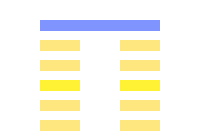
23.3.6 (23 > 15) - THE PO HEXAGRAM
- 3. The third line, divided, shows its subject among the overthrowers; but there will be no error.
- 6. The topmost line, undivided, shows its subject (as) a great fruit which has not been eaten. The superior man finds (the people again) as a chariot carrying him. The small men (by their course) overthrow their own dwellings.
23.3.6 (23 > 15) - Sacrificing one's best friends
One sends one's allies to great perils.
Bing DeepL Google Yandex23.3.6 (23 > 15) - Sacrificing one's best friends
One sends one's allies to great perils.
Bing DeepL Google Yandex23.3.6 (23 > 15) - Poh, l’écroulement
Poh : opprimer, renverser, traiter durement.
- 3. Renverser, faire crouler quelque chose sans suite regrettable. C’est quand on le fait légitimement et pour bonnes raisons. C’est que cela atteint également grands et petits (ou abandonne).
-
6. Fruit tout formé qu’on ne mange pas (bien acquis qui se détruit). Le sage, l’homme supérieur conquiert la terre (ou acquiert un char, le peuple qui le porte sur ses bras) ; l’homme bas et vulgaire fait crouler (poh) jusqu’à sa demeure (le fruit formé qu’il ne peut manger).
Il ne pourra plus en user.
23.3.6 (23 > 15) - Sacrifier ses meilleurs amis
On envoie ses alliés au devant de grands périls.
Bing DeepL Google Yandex23.3.6 (23 > 15) - Lepusztulás
- 3. Nem törődik a többiekkel többé.
- 6. Elfogadja a veszteséget. Támogatást és lehetőséget kap.
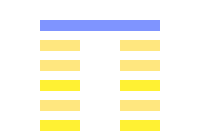
23.1.3.6 (23 > 36) - THE PO HEXAGRAM
- 1. The first line, divided, shows one overturning the couch by injuring its legs. (The injury will go on to) the destruction of (all) firm correctness, and there will be evil.
- 3. The third line, divided, shows its subject among the overthrowers; but there will be no error.
- 6. The topmost line, undivided, shows its subject (as) a great fruit which has not been eaten. The superior man finds (the people again) as a chariot carrying him. The small men (by their course) overthrow their own dwellings.
23.1.3.6 (23 > 36) - Fleeing the laws
One exiles oneself so one doesn't get caught.
Bing DeepL Google Yandex23.1.3.6 (23 > 36) - Fleeing the laws
One exiles oneself so one doesn't get caught.
Bing DeepL Google Yandex23.1.3.6 (23 > 36) - Poh, l’écroulement
Poh : opprimer, renverser, traiter durement.
-
1. Poh, « renverser, faire crouler » son lit en en brisant un pied et le détachant ainsi (suites funestes).
C’est le grand, le prince qui se nuit à lui-même en appauvrissant, affaiblissant son peuple. - 3. Renverser, faire crouler quelque chose sans suite regrettable. C’est quand on le fait légitimement et pour bonnes raisons. C’est que cela atteint également grands et petits (ou abandonne).
-
6. Fruit tout formé qu’on ne mange pas (bien acquis qui se détruit). Le sage, l’homme supérieur conquiert la terre (ou acquiert un char, le peuple qui le porte sur ses bras) ; l’homme bas et vulgaire fait crouler (poh) jusqu’à sa demeure (le fruit formé qu’il ne peut manger).
Il ne pourra plus en user.
23.1.3.6 (23 > 36) - Fuir les lois
On s'exile pour ne pas se faire prendre.
Bing DeepL Google Yandex23.1.3.6 (23 > 36) - Lepusztulás
- 1. Nem látja mit veszít.
- 3. Nem törődik a többiekkel többé.
- 6. Elfogadja a veszteséget. Támogatást és lehetőséget kap.
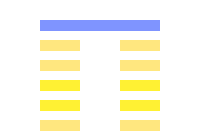
23.2.3.6 (23 > 46) - THE PO HEXAGRAM
- 2. The second line, divided, shows one overthrowing the couch by injuring its frame. (The injury will go on to) the destruction of (all) firm correctness, and there will be evil.
- 3. The third line, divided, shows its subject among the overthrowers; but there will be no error.
- 6. The topmost line, undivided, shows its subject (as) a great fruit which has not been eaten. The superior man finds (the people again) as a chariot carrying him. The small men (by their course) overthrow their own dwellings.
23.2.3.6 (23 > 46) - Aggravating one's situation
One does worse than the other times because they have not been condemned harshly enough.
Bing DeepL Google Yandex23.2.3.6 (23 > 46) - Aggravating one's situation
One does worse than the other times because they have not been condemned harshly enough.
Bing DeepL Google Yandex23.2.3.6 (23 > 46) - Poh, l’écroulement
Poh : opprimer, renverser, traiter durement.
-
2. [i]Id. (Poh)[i], renverser son lit en en brisant la forme ; ruine, issue destructive. C’est celui qui se perd lui-même en perdant ses auxiliaires ; un roi, ses ministres ; un grand, ses employés et amis. (Dicton.)
Il n’aura pas de compagnons.
C’est la ruine s’étendant, gagnant le haut. - 3. Renverser, faire crouler quelque chose sans suite regrettable. C’est quand on le fait légitimement et pour bonnes raisons. C’est que cela atteint également grands et petits (ou abandonne).
-
6. Fruit tout formé qu’on ne mange pas (bien acquis qui se détruit). Le sage, l’homme supérieur conquiert la terre (ou acquiert un char, le peuple qui le porte sur ses bras) ; l’homme bas et vulgaire fait crouler (poh) jusqu’à sa demeure (le fruit formé qu’il ne peut manger).
Il ne pourra plus en user.
23.2.3.6 (23 > 46) - Aggraver sa situation
On fait pire que les autres fois car on n'a pas été condamné assez sévèrement.
Bing DeepL Google Yandex23.2.3.6 (23 > 46) - Lepusztulás
- 2. Támasz, amire nem lehet számítani többé.
- 3. Nem törődik a többiekkel többé.
- 6. Elfogadja a veszteséget. Támogatást és lehetőséget kap.
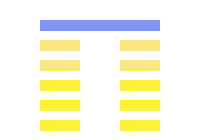
23.1.2.3.6 (23 > 11) - THE PO HEXAGRAM
- 1. The first line, divided, shows one overturning the couch by injuring its legs. (The injury will go on to) the destruction of (all) firm correctness, and there will be evil.
- 2. The second line, divided, shows one overthrowing the couch by injuring its frame. (The injury will go on to) the destruction of (all) firm correctness, and there will be evil.
- 3. The third line, divided, shows its subject among the overthrowers; but there will be no error.
- 6. The topmost line, undivided, shows its subject (as) a great fruit which has not been eaten. The superior man finds (the people again) as a chariot carrying him. The small men (by their course) overthrow their own dwellings.
23.1.2.3.6 (23 > 11) - Courting
One achieves one's goal by being courteous while remaining firm on one's values.
Bing DeepL Google Yandex23.1.2.3.6 (23 > 11) - Courting
One achieves one's goal by being courteous while remaining firm on one's values.
Bing DeepL Google Yandex23.1.2.3.6 (23 > 11) - Poh, l’écroulement
Poh : opprimer, renverser, traiter durement.
-
1. Poh, « renverser, faire crouler » son lit en en brisant un pied et le détachant ainsi (suites funestes).
C’est le grand, le prince qui se nuit à lui-même en appauvrissant, affaiblissant son peuple. -
2. [i]Id. (Poh)[i], renverser son lit en en brisant la forme ; ruine, issue destructive. C’est celui qui se perd lui-même en perdant ses auxiliaires ; un roi, ses ministres ; un grand, ses employés et amis. (Dicton.)
Il n’aura pas de compagnons.
C’est la ruine s’étendant, gagnant le haut. - 3. Renverser, faire crouler quelque chose sans suite regrettable. C’est quand on le fait légitimement et pour bonnes raisons. C’est que cela atteint également grands et petits (ou abandonne).
-
6. Fruit tout formé qu’on ne mange pas (bien acquis qui se détruit). Le sage, l’homme supérieur conquiert la terre (ou acquiert un char, le peuple qui le porte sur ses bras) ; l’homme bas et vulgaire fait crouler (poh) jusqu’à sa demeure (le fruit formé qu’il ne peut manger).
Il ne pourra plus en user.
23.1.2.3.6 (23 > 11) - Courtiser
On atteint son but en faisant preuve de courtoisie tout en restant ferme sur ses valeurs.
Bing DeepL Google Yandex23.1.2.3.6 (23 > 11) - Lepusztulás
- 1. Nem látja mit veszít.
- 2. Támasz, amire nem lehet számítani többé.
- 3. Nem törődik a többiekkel többé.
- 6. Elfogadja a veszteséget. Támogatást és lehetőséget kap.
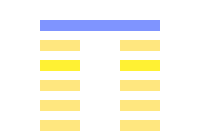
23.4.6 (23 > 16) - THE PO HEXAGRAM
- 4. The fourth line, divided, shows its subject having overthrown the couch, and (going to injure) the skin (of him who lies on it). There will be evil.
- 6. The topmost line, undivided, shows its subject (as) a great fruit which has not been eaten. The superior man finds (the people again) as a chariot carrying him. The small men (by their course) overthrow their own dwellings.
23.4.6 (23 > 16) - Losing vitality
One will not just make friends if one keeps fighting.
Bing DeepL Google Yandex23.4.6 (23 > 16) - Losing vitality
One will not just make friends if one keeps fighting.
Bing DeepL Google Yandex23.4.6 (23 > 16) - Poh, l’écroulement
Poh : opprimer, renverser, traiter durement.
-
4. Renverser son lit en s’écorchant, en se nuisant à soi-même, destruction certaine, calamité proche.
Suite de la gradation, en renversant on se blesse -
6. Fruit tout formé qu’on ne mange pas (bien acquis qui se détruit). Le sage, l’homme supérieur conquiert la terre (ou acquiert un char, le peuple qui le porte sur ses bras) ; l’homme bas et vulgaire fait crouler (poh) jusqu’à sa demeure (le fruit formé qu’il ne peut manger).
Il ne pourra plus en user.
23.4.6 (23 > 16) - Perdre son entrain
On ne se fera pas que des amis si l'on continue à se battre.
Bing DeepL Google Yandex23.4.6 (23 > 16) - Lepusztulás
- 4. Nem akar elviselni többé.
- 6. Elfogadja a veszteséget. Támogatást és lehetőséget kap.
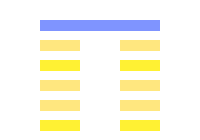
23.1.4.6 (23 > 51) - THE PO HEXAGRAM
- 1. The first line, divided, shows one overturning the couch by injuring its legs. (The injury will go on to) the destruction of (all) firm correctness, and there will be evil.
- 4. The fourth line, divided, shows its subject having overthrown the couch, and (going to injure) the skin (of him who lies on it). There will be evil.
- 6. The topmost line, undivided, shows its subject (as) a great fruit which has not been eaten. The superior man finds (the people again) as a chariot carrying him. The small men (by their course) overthrow their own dwellings.
23.1.4.6 (23 > 51) - Arbitrating a conflict
One separates those who confront each other by promising to find a solution to their problems.
Bing DeepL Google Yandex23.1.4.6 (23 > 51) - Arbitrating a conflict
One separates those who confront each other by promising to find a solution to their problems.
Bing DeepL Google Yandex23.1.4.6 (23 > 51) - Poh, l’écroulement
Poh : opprimer, renverser, traiter durement.
-
1. Poh, « renverser, faire crouler » son lit en en brisant un pied et le détachant ainsi (suites funestes).
C’est le grand, le prince qui se nuit à lui-même en appauvrissant, affaiblissant son peuple. -
4. Renverser son lit en s’écorchant, en se nuisant à soi-même, destruction certaine, calamité proche.
Suite de la gradation, en renversant on se blesse -
6. Fruit tout formé qu’on ne mange pas (bien acquis qui se détruit). Le sage, l’homme supérieur conquiert la terre (ou acquiert un char, le peuple qui le porte sur ses bras) ; l’homme bas et vulgaire fait crouler (poh) jusqu’à sa demeure (le fruit formé qu’il ne peut manger).
Il ne pourra plus en user.
23.1.4.6 (23 > 51) - Arbitrer un conflit
On sépare ceux qui s'affrontent en leur promettant de trouver une solution à leurs problèmes.
Bing DeepL Google Yandex23.1.4.6 (23 > 51) - Lepusztulás
- 1. Nem látja mit veszít.
- 4. Nem akar elviselni többé.
- 6. Elfogadja a veszteséget. Támogatást és lehetőséget kap.
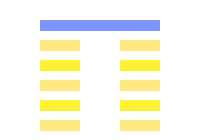
23.2.4.6 (23 > 40) - THE PO HEXAGRAM
- 2. The second line, divided, shows one overthrowing the couch by injuring its frame. (The injury will go on to) the destruction of (all) firm correctness, and there will be evil.
- 4. The fourth line, divided, shows its subject having overthrown the couch, and (going to injure) the skin (of him who lies on it). There will be evil.
- 6. The topmost line, undivided, shows its subject (as) a great fruit which has not been eaten. The superior man finds (the people again) as a chariot carrying him. The small men (by their course) overthrow their own dwellings.
23.2.4.6 (23 > 40) - Establishing a curfew
A measure aimed at restoring calm is welcomed.
Bing DeepL Google Yandex23.2.4.6 (23 > 40) - Establishing a curfew
A measure aimed at restoring calm is welcomed.
Bing DeepL Google Yandex23.2.4.6 (23 > 40) - Poh, l’écroulement
Poh : opprimer, renverser, traiter durement.
-
2. [i]Id. (Poh)[i], renverser son lit en en brisant la forme ; ruine, issue destructive. C’est celui qui se perd lui-même en perdant ses auxiliaires ; un roi, ses ministres ; un grand, ses employés et amis. (Dicton.)
Il n’aura pas de compagnons.
C’est la ruine s’étendant, gagnant le haut. -
4. Renverser son lit en s’écorchant, en se nuisant à soi-même, destruction certaine, calamité proche.
Suite de la gradation, en renversant on se blesse -
6. Fruit tout formé qu’on ne mange pas (bien acquis qui se détruit). Le sage, l’homme supérieur conquiert la terre (ou acquiert un char, le peuple qui le porte sur ses bras) ; l’homme bas et vulgaire fait crouler (poh) jusqu’à sa demeure (le fruit formé qu’il ne peut manger).
Il ne pourra plus en user.
23.2.4.6 (23 > 40) - Instaurer un couvre-feu
On plébiscite une mesure destinée à ramener le calme.
Bing DeepL Google Yandex23.2.4.6 (23 > 40) - Lepusztulás
- 2. Támasz, amire nem lehet számítani többé.
- 4. Nem akar elviselni többé.
- 6. Elfogadja a veszteséget. Támogatást és lehetőséget kap.
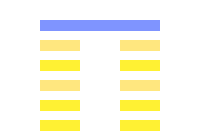
23.1.2.4.6 (23 > 54) - THE PO HEXAGRAM
- 1. The first line, divided, shows one overturning the couch by injuring its legs. (The injury will go on to) the destruction of (all) firm correctness, and there will be evil.
- 2. The second line, divided, shows one overthrowing the couch by injuring its frame. (The injury will go on to) the destruction of (all) firm correctness, and there will be evil.
- 4. The fourth line, divided, shows its subject having overthrown the couch, and (going to injure) the skin (of him who lies on it). There will be evil.
- 6. The topmost line, undivided, shows its subject (as) a great fruit which has not been eaten. The superior man finds (the people again) as a chariot carrying him. The small men (by their course) overthrow their own dwellings.
23.1.2.4.6 (23 > 54) - Pulling oneself together
One jokes about one's own decline when one should be looking for ways to remedy it.
Bing DeepL Google Yandex23.1.2.4.6 (23 > 54) - Pulling oneself together
One jokes about one's own decline when one should be looking for ways to remedy it.
Bing DeepL Google Yandex23.1.2.4.6 (23 > 54) - Poh, l’écroulement
Poh : opprimer, renverser, traiter durement.
-
1. Poh, « renverser, faire crouler » son lit en en brisant un pied et le détachant ainsi (suites funestes).
C’est le grand, le prince qui se nuit à lui-même en appauvrissant, affaiblissant son peuple. -
2. [i]Id. (Poh)[i], renverser son lit en en brisant la forme ; ruine, issue destructive. C’est celui qui se perd lui-même en perdant ses auxiliaires ; un roi, ses ministres ; un grand, ses employés et amis. (Dicton.)
Il n’aura pas de compagnons.
C’est la ruine s’étendant, gagnant le haut. -
4. Renverser son lit en s’écorchant, en se nuisant à soi-même, destruction certaine, calamité proche.
Suite de la gradation, en renversant on se blesse -
6. Fruit tout formé qu’on ne mange pas (bien acquis qui se détruit). Le sage, l’homme supérieur conquiert la terre (ou acquiert un char, le peuple qui le porte sur ses bras) ; l’homme bas et vulgaire fait crouler (poh) jusqu’à sa demeure (le fruit formé qu’il ne peut manger).
Il ne pourra plus en user.
23.1.2.4.6 (23 > 54) - Se ressaisir
On plaisante sur sa propre déchéance alors qu'on devrait chercher les moyens d'y remédier.
Bing DeepL Google Yandex23.1.2.4.6 (23 > 54) - Lepusztulás
- 1. Nem látja mit veszít.
- 2. Támasz, amire nem lehet számítani többé.
- 4. Nem akar elviselni többé.
- 6. Elfogadja a veszteséget. Támogatást és lehetőséget kap.
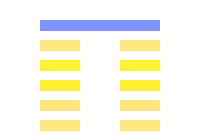
23.3.4.6 (23 > 62) - THE PO HEXAGRAM
- 3. The third line, divided, shows its subject among the overthrowers; but there will be no error.
- 4. The fourth line, divided, shows its subject having overthrown the couch, and (going to injure) the skin (of him who lies on it). There will be evil.
- 6. The topmost line, undivided, shows its subject (as) a great fruit which has not been eaten. The superior man finds (the people again) as a chariot carrying him. The small men (by their course) overthrow their own dwellings.
23.3.4.6 (23 > 62) - Wanting to understand the reasoning
One closely monitors the logic of the statement made.
Bing DeepL Google Yandex23.3.4.6 (23 > 62) - Wanting to understand the reasoning
One closely monitors the logic of the statement made.
Bing DeepL Google Yandex23.3.4.6 (23 > 62) - Poh, l’écroulement
Poh : opprimer, renverser, traiter durement.
- 3. Renverser, faire crouler quelque chose sans suite regrettable. C’est quand on le fait légitimement et pour bonnes raisons. C’est que cela atteint également grands et petits (ou abandonne).
-
4. Renverser son lit en s’écorchant, en se nuisant à soi-même, destruction certaine, calamité proche.
Suite de la gradation, en renversant on se blesse -
6. Fruit tout formé qu’on ne mange pas (bien acquis qui se détruit). Le sage, l’homme supérieur conquiert la terre (ou acquiert un char, le peuple qui le porte sur ses bras) ; l’homme bas et vulgaire fait crouler (poh) jusqu’à sa demeure (le fruit formé qu’il ne peut manger).
Il ne pourra plus en user.
23.3.4.6 (23 > 62) - Vouloir comprendre le raisonnement
On suit avec attention la logique des propos tenus.
Bing DeepL Google Yandex23.3.4.6 (23 > 62) - Lepusztulás
- 3. Nem törődik a többiekkel többé.
- 4. Nem akar elviselni többé.
- 6. Elfogadja a veszteséget. Támogatást és lehetőséget kap.
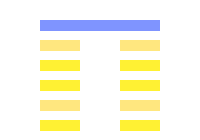
23.1.3.4.6 (23 > 55) - THE PO HEXAGRAM
- 1. The first line, divided, shows one overturning the couch by injuring its legs. (The injury will go on to) the destruction of (all) firm correctness, and there will be evil.
- 3. The third line, divided, shows its subject among the overthrowers; but there will be no error.
- 4. The fourth line, divided, shows its subject having overthrown the couch, and (going to injure) the skin (of him who lies on it). There will be evil.
- 6. The topmost line, undivided, shows its subject (as) a great fruit which has not been eaten. The superior man finds (the people again) as a chariot carrying him. The small men (by their course) overthrow their own dwellings.
23.1.3.4.6 (23 > 55) - Failing to comply
One pretends a bad feeling for not doing one's duty.
Bing DeepL Google Yandex23.1.3.4.6 (23 > 55) - Failing to comply
One pretends a bad feeling for not doing one's duty.
Bing DeepL Google Yandex23.1.3.4.6 (23 > 55) - Poh, l’écroulement
Poh : opprimer, renverser, traiter durement.
-
1. Poh, « renverser, faire crouler » son lit en en brisant un pied et le détachant ainsi (suites funestes).
C’est le grand, le prince qui se nuit à lui-même en appauvrissant, affaiblissant son peuple. - 3. Renverser, faire crouler quelque chose sans suite regrettable. C’est quand on le fait légitimement et pour bonnes raisons. C’est que cela atteint également grands et petits (ou abandonne).
-
4. Renverser son lit en s’écorchant, en se nuisant à soi-même, destruction certaine, calamité proche.
Suite de la gradation, en renversant on se blesse -
6. Fruit tout formé qu’on ne mange pas (bien acquis qui se détruit). Le sage, l’homme supérieur conquiert la terre (ou acquiert un char, le peuple qui le porte sur ses bras) ; l’homme bas et vulgaire fait crouler (poh) jusqu’à sa demeure (le fruit formé qu’il ne peut manger).
Il ne pourra plus en user.
23.1.3.4.6 (23 > 55) - Se défiler
On prétexte un mauvais pressentiment pour ne pas faire son devoir.
Bing DeepL Google Yandex23.1.3.4.6 (23 > 55) - Lepusztulás
- 1. Nem látja mit veszít.
- 3. Nem törődik a többiekkel többé.
- 4. Nem akar elviselni többé.
- 6. Elfogadja a veszteséget. Támogatást és lehetőséget kap.
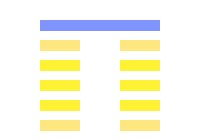
23.2.3.4.6 (23 > 32) - THE PO HEXAGRAM
- 2. The second line, divided, shows one overthrowing the couch by injuring its frame. (The injury will go on to) the destruction of (all) firm correctness, and there will be evil.
- 3. The third line, divided, shows its subject among the overthrowers; but there will be no error.
- 4. The fourth line, divided, shows its subject having overthrown the couch, and (going to injure) the skin (of him who lies on it). There will be evil.
- 6. The topmost line, undivided, shows its subject (as) a great fruit which has not been eaten. The superior man finds (the people again) as a chariot carrying him. The small men (by their course) overthrow their own dwellings.
23.2.3.4.6 (23 > 32) - Continuing without a coach
One would be wrong to believe that others could succeed without practice.
Bing DeepL Google Yandex23.2.3.4.6 (23 > 32) - Continuing without a coach
One would be wrong to believe that others could succeed without practice.
Bing DeepL Google Yandex23.2.3.4.6 (23 > 32) - Poh, l’écroulement
Poh : opprimer, renverser, traiter durement.
-
2. [i]Id. (Poh)[i], renverser son lit en en brisant la forme ; ruine, issue destructive. C’est celui qui se perd lui-même en perdant ses auxiliaires ; un roi, ses ministres ; un grand, ses employés et amis. (Dicton.)
Il n’aura pas de compagnons.
C’est la ruine s’étendant, gagnant le haut. - 3. Renverser, faire crouler quelque chose sans suite regrettable. C’est quand on le fait légitimement et pour bonnes raisons. C’est que cela atteint également grands et petits (ou abandonne).
-
4. Renverser son lit en s’écorchant, en se nuisant à soi-même, destruction certaine, calamité proche.
Suite de la gradation, en renversant on se blesse -
6. Fruit tout formé qu’on ne mange pas (bien acquis qui se détruit). Le sage, l’homme supérieur conquiert la terre (ou acquiert un char, le peuple qui le porte sur ses bras) ; l’homme bas et vulgaire fait crouler (poh) jusqu’à sa demeure (le fruit formé qu’il ne peut manger).
Il ne pourra plus en user.
23.2.3.4.6 (23 > 32) - Continuer sans entraîneur
On aurait tort de croire que les autres ont pu réussir sans entraînement.
Bing DeepL Google Yandex23.2.3.4.6 (23 > 32) - Lepusztulás
- 2. Támasz, amire nem lehet számítani többé.
- 3. Nem törődik a többiekkel többé.
- 4. Nem akar elviselni többé.
- 6. Elfogadja a veszteséget. Támogatást és lehetőséget kap.
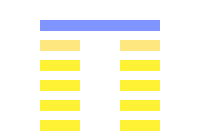
23.1.2.3.4.6 (23 > 34) - THE PO HEXAGRAM
- 1. The first line, divided, shows one overturning the couch by injuring its legs. (The injury will go on to) the destruction of (all) firm correctness, and there will be evil.
- 2. The second line, divided, shows one overthrowing the couch by injuring its frame. (The injury will go on to) the destruction of (all) firm correctness, and there will be evil.
- 3. The third line, divided, shows its subject among the overthrowers; but there will be no error.
- 4. The fourth line, divided, shows its subject having overthrown the couch, and (going to injure) the skin (of him who lies on it). There will be evil.
- 6. The topmost line, undivided, shows its subject (as) a great fruit which has not been eaten. The superior man finds (the people again) as a chariot carrying him. The small men (by their course) overthrow their own dwellings.
23.1.2.3.4.6 (23 > 34) - Sterilising the debate
One specifically complicates things as much so that nobody can find their way around.
Bing DeepL Google Yandex23.1.2.3.4.6 (23 > 34) - Sterilizing the debate
One specifically complicates things as much so that nobody can find their way around.
Bing DeepL Google Yandex23.1.2.3.4.6 (23 > 34) - Poh, l’écroulement
Poh : opprimer, renverser, traiter durement.
-
1. Poh, « renverser, faire crouler » son lit en en brisant un pied et le détachant ainsi (suites funestes).
C’est le grand, le prince qui se nuit à lui-même en appauvrissant, affaiblissant son peuple. -
2. [i]Id. (Poh)[i], renverser son lit en en brisant la forme ; ruine, issue destructive. C’est celui qui se perd lui-même en perdant ses auxiliaires ; un roi, ses ministres ; un grand, ses employés et amis. (Dicton.)
Il n’aura pas de compagnons.
C’est la ruine s’étendant, gagnant le haut. - 3. Renverser, faire crouler quelque chose sans suite regrettable. C’est quand on le fait légitimement et pour bonnes raisons. C’est que cela atteint également grands et petits (ou abandonne).
-
4. Renverser son lit en s’écorchant, en se nuisant à soi-même, destruction certaine, calamité proche.
Suite de la gradation, en renversant on se blesse -
6. Fruit tout formé qu’on ne mange pas (bien acquis qui se détruit). Le sage, l’homme supérieur conquiert la terre (ou acquiert un char, le peuple qui le porte sur ses bras) ; l’homme bas et vulgaire fait crouler (poh) jusqu’à sa demeure (le fruit formé qu’il ne peut manger).
Il ne pourra plus en user.
23.1.2.3.4.6 (23 > 34) - Stériliser le débat
On complique les choses à souhait pour que personne ne s'y retrouve.
Bing DeepL Google Yandex23.1.2.3.4.6 (23 > 34) - Lepusztulás
- 1. Nem látja mit veszít.
- 2. Támasz, amire nem lehet számítani többé.
- 3. Nem törődik a többiekkel többé.
- 4. Nem akar elviselni többé.
- 6. Elfogadja a veszteséget. Támogatást és lehetőséget kap.
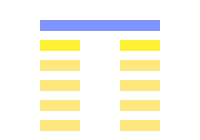
23.5.6 (23 > 8) - THE PO HEXAGRAM
- 5. The fifth line, divided, shows (its subject leading on the others like) a string of fishes, and (obtaining for them) the favour that lights on the inmates of the palace. There will be advantage in every way.
- 6. The topmost line, undivided, shows its subject (as) a great fruit which has not been eaten. The superior man finds (the people again) as a chariot carrying him. The small men (by their course) overthrow their own dwellings.
23.5.6 (23 > 8) - Giving oneself entirely
One depletes their resources by going to those who are inclined to take everything.
Bing DeepL Google Yandex23.5.6 (23 > 8) - Giving oneself entirely
One depletes their resources by going to those who are inclined to take everything.
Bing DeepL Google Yandex23.5.6 (23 > 8) - Poh, l’écroulement
Poh : opprimer, renverser, traiter durement.
-
5. Le prince généreux envers les gens du palais (litt.(/i] : qui enfile des poissons pour en faire présent), en retirera des avantages certains.
Peut-être devrait-on admettre déjà ici l’élément figuratif et symbolique, et voir dans l’hexagramme la figure du prince (ligne pleine supérieure) au-dessus de ses officiers rangés comme des poissons séchés et traduire : avoir des officiers comme des poissons enfilés. Alors, il s’agirait de [i]p’o, gens du palais. -
6. Fruit tout formé qu’on ne mange pas (bien acquis qui se détruit). Le sage, l’homme supérieur conquiert la terre (ou acquiert un char, le peuple qui le porte sur ses bras) ; l’homme bas et vulgaire fait crouler (poh) jusqu’à sa demeure (le fruit formé qu’il ne peut manger).
Il ne pourra plus en user.
23.5.6 (23 > 8) - Se donner entièrement
On épuise ses ressources en allant vers ceux qui sont enclins à tout prendre.
Bing DeepL Google Yandex23.5.6 (23 > 8) - Lepusztulás
- 5. Látja mi nem működik.
- 6. Elfogadja a veszteséget. Támogatást és lehetőséget kap.
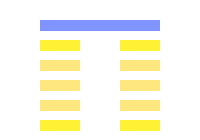
23.1.5.6 (23 > 3) - THE PO HEXAGRAM
- 1. The first line, divided, shows one overturning the couch by injuring its legs. (The injury will go on to) the destruction of (all) firm correctness, and there will be evil.
- 5. The fifth line, divided, shows (its subject leading on the others like) a string of fishes, and (obtaining for them) the favour that lights on the inmates of the palace. There will be advantage in every way.
- 6. The topmost line, undivided, shows its subject (as) a great fruit which has not been eaten. The superior man finds (the people again) as a chariot carrying him. The small men (by their course) overthrow their own dwellings.
23.1.5.6 (23 > 3) - Looking for housing
One leaves to go to those who can accommodate them.
Bing DeepL Google Yandex23.1.5.6 (23 > 3) - Looking for housing
One leaves to go to those who can accommodate them.
Bing DeepL Google Yandex23.1.5.6 (23 > 3) - Poh, l’écroulement
Poh : opprimer, renverser, traiter durement.
-
1. Poh, « renverser, faire crouler » son lit en en brisant un pied et le détachant ainsi (suites funestes).
C’est le grand, le prince qui se nuit à lui-même en appauvrissant, affaiblissant son peuple. -
5. Le prince généreux envers les gens du palais (litt.(/i] : qui enfile des poissons pour en faire présent), en retirera des avantages certains.
Peut-être devrait-on admettre déjà ici l’élément figuratif et symbolique, et voir dans l’hexagramme la figure du prince (ligne pleine supérieure) au-dessus de ses officiers rangés comme des poissons séchés et traduire : avoir des officiers comme des poissons enfilés. Alors, il s’agirait de [i]p’o, gens du palais. -
6. Fruit tout formé qu’on ne mange pas (bien acquis qui se détruit). Le sage, l’homme supérieur conquiert la terre (ou acquiert un char, le peuple qui le porte sur ses bras) ; l’homme bas et vulgaire fait crouler (poh) jusqu’à sa demeure (le fruit formé qu’il ne peut manger).
Il ne pourra plus en user.
23.1.5.6 (23 > 3) - Chercher un toit
On part pour se rendre chez ceux qui ont des possibilités d'accueil.
Bing DeepL Google Yandex23.1.5.6 (23 > 3) - Lepusztulás
- 1. Nem látja mit veszít.
- 5. Látja mi nem működik.
- 6. Elfogadja a veszteséget. Támogatást és lehetőséget kap.
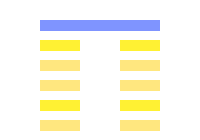
23.2.5.6 (23 > 29) - THE PO HEXAGRAM
- 2. The second line, divided, shows one overthrowing the couch by injuring its frame. (The injury will go on to) the destruction of (all) firm correctness, and there will be evil.
- 5. The fifth line, divided, shows (its subject leading on the others like) a string of fishes, and (obtaining for them) the favour that lights on the inmates of the palace. There will be advantage in every way.
- 6. The topmost line, undivided, shows its subject (as) a great fruit which has not been eaten. The superior man finds (the people again) as a chariot carrying him. The small men (by their course) overthrow their own dwellings.
23.2.5.6 (23 > 29) - Preventing risks
One sets up a procedure so that others are able to pay attention to the smallest details.
Bing DeepL Google Yandex23.2.5.6 (23 > 29) - Preventing risks
One sets up a procedure so that others are able to pay attention to the smallest details.
Bing DeepL Google Yandex23.2.5.6 (23 > 29) - Poh, l’écroulement
Poh : opprimer, renverser, traiter durement.
-
2. [i]Id. (Poh)[i], renverser son lit en en brisant la forme ; ruine, issue destructive. C’est celui qui se perd lui-même en perdant ses auxiliaires ; un roi, ses ministres ; un grand, ses employés et amis. (Dicton.)
Il n’aura pas de compagnons.
C’est la ruine s’étendant, gagnant le haut. -
5. Le prince généreux envers les gens du palais (litt.(/i] : qui enfile des poissons pour en faire présent), en retirera des avantages certains.
Peut-être devrait-on admettre déjà ici l’élément figuratif et symbolique, et voir dans l’hexagramme la figure du prince (ligne pleine supérieure) au-dessus de ses officiers rangés comme des poissons séchés et traduire : avoir des officiers comme des poissons enfilés. Alors, il s’agirait de [i]p’o, gens du palais. -
6. Fruit tout formé qu’on ne mange pas (bien acquis qui se détruit). Le sage, l’homme supérieur conquiert la terre (ou acquiert un char, le peuple qui le porte sur ses bras) ; l’homme bas et vulgaire fait crouler (poh) jusqu’à sa demeure (le fruit formé qu’il ne peut manger).
Il ne pourra plus en user.
23.2.5.6 (23 > 29) - Prévenir les risques
On met en place une procédure pour que les autres soient en mesure de faire attention aux moindres détails.
Bing DeepL Google Yandex23.2.5.6 (23 > 29) - Lepusztulás
- 2. Támasz, amire nem lehet számítani többé.
- 5. Látja mi nem működik.
- 6. Elfogadja a veszteséget. Támogatást és lehetőséget kap.
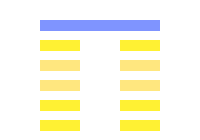
23.1.2.5.6 (23 > 60) - THE PO HEXAGRAM
- 1. The first line, divided, shows one overturning the couch by injuring its legs. (The injury will go on to) the destruction of (all) firm correctness, and there will be evil.
- 2. The second line, divided, shows one overthrowing the couch by injuring its frame. (The injury will go on to) the destruction of (all) firm correctness, and there will be evil.
- 5. The fifth line, divided, shows (its subject leading on the others like) a string of fishes, and (obtaining for them) the favour that lights on the inmates of the palace. There will be advantage in every way.
- 6. The topmost line, undivided, shows its subject (as) a great fruit which has not been eaten. The superior man finds (the people again) as a chariot carrying him. The small men (by their course) overthrow their own dwellings.
23.1.2.5.6 (23 > 60) - Clouding the issue
One creates a misunderstanding so one doesn't have to explain oneself.
Bing DeepL Google Yandex23.1.2.5.6 (23 > 60) - Clouding the issue
One creates a misunderstanding so one doesn't have to explain oneself.
Bing DeepL Google Yandex23.1.2.5.6 (23 > 60) - Poh, l’écroulement
Poh : opprimer, renverser, traiter durement.
-
1. Poh, « renverser, faire crouler » son lit en en brisant un pied et le détachant ainsi (suites funestes).
C’est le grand, le prince qui se nuit à lui-même en appauvrissant, affaiblissant son peuple. -
2. [i]Id. (Poh)[i], renverser son lit en en brisant la forme ; ruine, issue destructive. C’est celui qui se perd lui-même en perdant ses auxiliaires ; un roi, ses ministres ; un grand, ses employés et amis. (Dicton.)
Il n’aura pas de compagnons.
C’est la ruine s’étendant, gagnant le haut. -
5. Le prince généreux envers les gens du palais (litt.(/i] : qui enfile des poissons pour en faire présent), en retirera des avantages certains.
Peut-être devrait-on admettre déjà ici l’élément figuratif et symbolique, et voir dans l’hexagramme la figure du prince (ligne pleine supérieure) au-dessus de ses officiers rangés comme des poissons séchés et traduire : avoir des officiers comme des poissons enfilés. Alors, il s’agirait de [i]p’o, gens du palais. -
6. Fruit tout formé qu’on ne mange pas (bien acquis qui se détruit). Le sage, l’homme supérieur conquiert la terre (ou acquiert un char, le peuple qui le porte sur ses bras) ; l’homme bas et vulgaire fait crouler (poh) jusqu’à sa demeure (le fruit formé qu’il ne peut manger).
Il ne pourra plus en user.
23.1.2.5.6 (23 > 60) - Brouiller les pistes
On crée un malentendu pour ne pas avoir à s'expliquer.
Bing DeepL Google Yandex23.1.2.5.6 (23 > 60) - Lepusztulás
- 1. Nem látja mit veszít.
- 2. Támasz, amire nem lehet számítani többé.
- 5. Látja mi nem működik.
- 6. Elfogadja a veszteséget. Támogatást és lehetőséget kap.
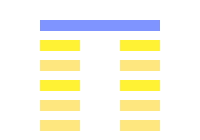
23.3.5.6 (23 > 39) - THE PO HEXAGRAM
- 3. The third line, divided, shows its subject among the overthrowers; but there will be no error.
- 5. The fifth line, divided, shows (its subject leading on the others like) a string of fishes, and (obtaining for them) the favour that lights on the inmates of the palace. There will be advantage in every way.
- 6. The topmost line, undivided, shows its subject (as) a great fruit which has not been eaten. The superior man finds (the people again) as a chariot carrying him. The small men (by their course) overthrow their own dwellings.
23.3.5.6 (23 > 39) - Relapsing
One comes back to almost the same place to commit the same mistake.
Bing DeepL Google Yandex23.3.5.6 (23 > 39) - Relapsing
One comes back to almost the same place to commit the same mistake.
Bing DeepL Google Yandex23.3.5.6 (23 > 39) - Poh, l’écroulement
Poh : opprimer, renverser, traiter durement.
- 3. Renverser, faire crouler quelque chose sans suite regrettable. C’est quand on le fait légitimement et pour bonnes raisons. C’est que cela atteint également grands et petits (ou abandonne).
-
5. Le prince généreux envers les gens du palais (litt.(/i] : qui enfile des poissons pour en faire présent), en retirera des avantages certains.
Peut-être devrait-on admettre déjà ici l’élément figuratif et symbolique, et voir dans l’hexagramme la figure du prince (ligne pleine supérieure) au-dessus de ses officiers rangés comme des poissons séchés et traduire : avoir des officiers comme des poissons enfilés. Alors, il s’agirait de [i]p’o, gens du palais. -
6. Fruit tout formé qu’on ne mange pas (bien acquis qui se détruit). Le sage, l’homme supérieur conquiert la terre (ou acquiert un char, le peuple qui le porte sur ses bras) ; l’homme bas et vulgaire fait crouler (poh) jusqu’à sa demeure (le fruit formé qu’il ne peut manger).
Il ne pourra plus en user.
23.3.5.6 (23 > 39) - Récidiver
On revient à peu près au même endroit pour commettre la même faute.
Bing DeepL Google Yandex23.3.5.6 (23 > 39) - Lepusztulás
- 3. Nem törődik a többiekkel többé.
- 5. Látja mi nem működik.
- 6. Elfogadja a veszteséget. Támogatást és lehetőséget kap.
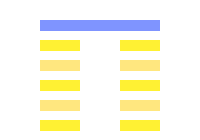
23.1.3.5.6 (23 > 63) - THE PO HEXAGRAM
- 1. The first line, divided, shows one overturning the couch by injuring its legs. (The injury will go on to) the destruction of (all) firm correctness, and there will be evil.
- 3. The third line, divided, shows its subject among the overthrowers; but there will be no error.
- 5. The fifth line, divided, shows (its subject leading on the others like) a string of fishes, and (obtaining for them) the favour that lights on the inmates of the palace. There will be advantage in every way.
- 6. The topmost line, undivided, shows its subject (as) a great fruit which has not been eaten. The superior man finds (the people again) as a chariot carrying him. The small men (by their course) overthrow their own dwellings.
23.1.3.5.6 (23 > 63) - Losing firmness
One collapses before finding any support.
Bing DeepL Google Yandex23.1.3.5.6 (23 > 63) - Losing firmness
One collapses before finding any support.
Bing DeepL Google Yandex23.1.3.5.6 (23 > 63) - Poh, l’écroulement
Poh : opprimer, renverser, traiter durement.
-
1. Poh, « renverser, faire crouler » son lit en en brisant un pied et le détachant ainsi (suites funestes).
C’est le grand, le prince qui se nuit à lui-même en appauvrissant, affaiblissant son peuple. - 3. Renverser, faire crouler quelque chose sans suite regrettable. C’est quand on le fait légitimement et pour bonnes raisons. C’est que cela atteint également grands et petits (ou abandonne).
-
5. Le prince généreux envers les gens du palais (litt.(/i] : qui enfile des poissons pour en faire présent), en retirera des avantages certains.
Peut-être devrait-on admettre déjà ici l’élément figuratif et symbolique, et voir dans l’hexagramme la figure du prince (ligne pleine supérieure) au-dessus de ses officiers rangés comme des poissons séchés et traduire : avoir des officiers comme des poissons enfilés. Alors, il s’agirait de [i]p’o, gens du palais. -
6. Fruit tout formé qu’on ne mange pas (bien acquis qui se détruit). Le sage, l’homme supérieur conquiert la terre (ou acquiert un char, le peuple qui le porte sur ses bras) ; l’homme bas et vulgaire fait crouler (poh) jusqu’à sa demeure (le fruit formé qu’il ne peut manger).
Il ne pourra plus en user.
23.1.3.5.6 (23 > 63) - Perdre sa fermeté
On s'affaisse avant d'avoir pu trouver le moindre soutien.
Bing DeepL Google Yandex23.1.3.5.6 (23 > 63) - Lepusztulás
- 1. Nem látja mit veszít.
- 3. Nem törődik a többiekkel többé.
- 5. Látja mi nem működik.
- 6. Elfogadja a veszteséget. Támogatást és lehetőséget kap.
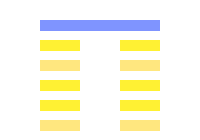
23.2.3.5.6 (23 > 48) - THE PO HEXAGRAM
- 2. The second line, divided, shows one overthrowing the couch by injuring its frame. (The injury will go on to) the destruction of (all) firm correctness, and there will be evil.
- 3. The third line, divided, shows its subject among the overthrowers; but there will be no error.
- 5. The fifth line, divided, shows (its subject leading on the others like) a string of fishes, and (obtaining for them) the favour that lights on the inmates of the palace. There will be advantage in every way.
- 6. The topmost line, undivided, shows its subject (as) a great fruit which has not been eaten. The superior man finds (the people again) as a chariot carrying him. The small men (by their course) overthrow their own dwellings.
23.2.3.5.6 (23 > 48) - Escaping from resentment
One flees rather than listen to a speech full of acrimony.
Bing DeepL Google Yandex23.2.3.5.6 (23 > 48) - Escaping from resentment
One flees rather than listen to a speech full of acrimony.
Bing DeepL Google Yandex23.2.3.5.6 (23 > 48) - Poh, l’écroulement
Poh : opprimer, renverser, traiter durement.
-
2. [i]Id. (Poh)[i], renverser son lit en en brisant la forme ; ruine, issue destructive. C’est celui qui se perd lui-même en perdant ses auxiliaires ; un roi, ses ministres ; un grand, ses employés et amis. (Dicton.)
Il n’aura pas de compagnons.
C’est la ruine s’étendant, gagnant le haut. - 3. Renverser, faire crouler quelque chose sans suite regrettable. C’est quand on le fait légitimement et pour bonnes raisons. C’est que cela atteint également grands et petits (ou abandonne).
-
5. Le prince généreux envers les gens du palais (litt.(/i] : qui enfile des poissons pour en faire présent), en retirera des avantages certains.
Peut-être devrait-on admettre déjà ici l’élément figuratif et symbolique, et voir dans l’hexagramme la figure du prince (ligne pleine supérieure) au-dessus de ses officiers rangés comme des poissons séchés et traduire : avoir des officiers comme des poissons enfilés. Alors, il s’agirait de [i]p’o, gens du palais. -
6. Fruit tout formé qu’on ne mange pas (bien acquis qui se détruit). Le sage, l’homme supérieur conquiert la terre (ou acquiert un char, le peuple qui le porte sur ses bras) ; l’homme bas et vulgaire fait crouler (poh) jusqu’à sa demeure (le fruit formé qu’il ne peut manger).
Il ne pourra plus en user.
23.2.3.5.6 (23 > 48) - S'évader de la rancœur
On fuit plutôt que d'écouter un discours plein d'acrimonie.
Bing DeepL Google Yandex23.2.3.5.6 (23 > 48) - Lepusztulás
- 2. Támasz, amire nem lehet számítani többé.
- 3. Nem törődik a többiekkel többé.
- 5. Látja mi nem működik.
- 6. Elfogadja a veszteséget. Támogatást és lehetőséget kap.
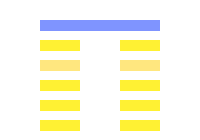
23.1.2.3.5.6 (23 > 5) - THE PO HEXAGRAM
- 1. The first line, divided, shows one overturning the couch by injuring its legs. (The injury will go on to) the destruction of (all) firm correctness, and there will be evil.
- 2. The second line, divided, shows one overthrowing the couch by injuring its frame. (The injury will go on to) the destruction of (all) firm correctness, and there will be evil.
- 3. The third line, divided, shows its subject among the overthrowers; but there will be no error.
- 5. The fifth line, divided, shows (its subject leading on the others like) a string of fishes, and (obtaining for them) the favour that lights on the inmates of the palace. There will be advantage in every way.
- 6. The topmost line, undivided, shows its subject (as) a great fruit which has not been eaten. The superior man finds (the people again) as a chariot carrying him. The small men (by their course) overthrow their own dwellings.
23.1.2.3.5.6 (23 > 5) - Imposing one's views
One presents their conclusions to those who have no other choice than accepting them.
Bing DeepL Google Yandex23.1.2.3.5.6 (23 > 5) - Imposing one's views
One presents their conclusions to those who have no other choice than accepting them.
Bing DeepL Google Yandex23.1.2.3.5.6 (23 > 5) - Poh, l’écroulement
Poh : opprimer, renverser, traiter durement.
-
1. Poh, « renverser, faire crouler » son lit en en brisant un pied et le détachant ainsi (suites funestes).
C’est le grand, le prince qui se nuit à lui-même en appauvrissant, affaiblissant son peuple. -
2. [i]Id. (Poh)[i], renverser son lit en en brisant la forme ; ruine, issue destructive. C’est celui qui se perd lui-même en perdant ses auxiliaires ; un roi, ses ministres ; un grand, ses employés et amis. (Dicton.)
Il n’aura pas de compagnons.
C’est la ruine s’étendant, gagnant le haut. - 3. Renverser, faire crouler quelque chose sans suite regrettable. C’est quand on le fait légitimement et pour bonnes raisons. C’est que cela atteint également grands et petits (ou abandonne).
-
5. Le prince généreux envers les gens du palais (litt.(/i] : qui enfile des poissons pour en faire présent), en retirera des avantages certains.
Peut-être devrait-on admettre déjà ici l’élément figuratif et symbolique, et voir dans l’hexagramme la figure du prince (ligne pleine supérieure) au-dessus de ses officiers rangés comme des poissons séchés et traduire : avoir des officiers comme des poissons enfilés. Alors, il s’agirait de [i]p’o, gens du palais. -
6. Fruit tout formé qu’on ne mange pas (bien acquis qui se détruit). Le sage, l’homme supérieur conquiert la terre (ou acquiert un char, le peuple qui le porte sur ses bras) ; l’homme bas et vulgaire fait crouler (poh) jusqu’à sa demeure (le fruit formé qu’il ne peut manger).
Il ne pourra plus en user.
23.1.2.3.5.6 (23 > 5) - Imposer ses vues
On présente ses conclusions à ceux qui n'ont pas d'autre choix que de les accepter.
Bing DeepL Google Yandex23.1.2.3.5.6 (23 > 5) - Lepusztulás
- 1. Nem látja mit veszít.
- 2. Támasz, amire nem lehet számítani többé.
- 3. Nem törődik a többiekkel többé.
- 5. Látja mi nem működik.
- 6. Elfogadja a veszteséget. Támogatást és lehetőséget kap.
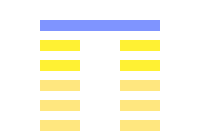
23.4.5.6 (23 > 45) - THE PO HEXAGRAM
- 4. The fourth line, divided, shows its subject having overthrown the couch, and (going to injure) the skin (of him who lies on it). There will be evil.
- 5. The fifth line, divided, shows (its subject leading on the others like) a string of fishes, and (obtaining for them) the favour that lights on the inmates of the palace. There will be advantage in every way.
- 6. The topmost line, undivided, shows its subject (as) a great fruit which has not been eaten. The superior man finds (the people again) as a chariot carrying him. The small men (by their course) overthrow their own dwellings.
23.4.5.6 (23 > 45) - Gathering before the battle
One prays to God to ask for His blessing.
Bing DeepL Google Yandex23.4.5.6 (23 > 45) - Gathering before the battle
One prays to God to ask for His blessing.
Bing DeepL Google Yandex23.4.5.6 (23 > 45) - Poh, l’écroulement
Poh : opprimer, renverser, traiter durement.
-
4. Renverser son lit en s’écorchant, en se nuisant à soi-même, destruction certaine, calamité proche.
Suite de la gradation, en renversant on se blesse -
5. Le prince généreux envers les gens du palais (litt.(/i] : qui enfile des poissons pour en faire présent), en retirera des avantages certains.
Peut-être devrait-on admettre déjà ici l’élément figuratif et symbolique, et voir dans l’hexagramme la figure du prince (ligne pleine supérieure) au-dessus de ses officiers rangés comme des poissons séchés et traduire : avoir des officiers comme des poissons enfilés. Alors, il s’agirait de [i]p’o, gens du palais. -
6. Fruit tout formé qu’on ne mange pas (bien acquis qui se détruit). Le sage, l’homme supérieur conquiert la terre (ou acquiert un char, le peuple qui le porte sur ses bras) ; l’homme bas et vulgaire fait crouler (poh) jusqu’à sa demeure (le fruit formé qu’il ne peut manger).
Il ne pourra plus en user.
23.4.5.6 (23 > 45) - Se recueillir avant le combat
On prie Dieu pour Lui demander Sa bénédiction.
Bing DeepL Google Yandex23.4.5.6 (23 > 45) - Lepusztulás
- 4. Nem akar elviselni többé.
- 5. Látja mi nem működik.
- 6. Elfogadja a veszteséget. Támogatást és lehetőséget kap.
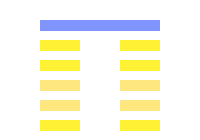
23.1.4.5.6 (23 > 17) - THE PO HEXAGRAM
- 1. The first line, divided, shows one overturning the couch by injuring its legs. (The injury will go on to) the destruction of (all) firm correctness, and there will be evil.
- 4. The fourth line, divided, shows its subject having overthrown the couch, and (going to injure) the skin (of him who lies on it). There will be evil.
- 5. The fifth line, divided, shows (its subject leading on the others like) a string of fishes, and (obtaining for them) the favour that lights on the inmates of the palace. There will be advantage in every way.
- 6. The topmost line, undivided, shows its subject (as) a great fruit which has not been eaten. The superior man finds (the people again) as a chariot carrying him. The small men (by their course) overthrow their own dwellings.
23.1.4.5.6 (23 > 17) - Presenting without conviction
One gets tired of repeating the same pitch over and over again.
Bing DeepL Google Yandex23.1.4.5.6 (23 > 17) - Presenting without conviction
One gets tired of repeating the same pitch over and over again.
Bing DeepL Google Yandex23.1.4.5.6 (23 > 17) - Poh, l’écroulement
Poh : opprimer, renverser, traiter durement.
-
1. Poh, « renverser, faire crouler » son lit en en brisant un pied et le détachant ainsi (suites funestes).
C’est le grand, le prince qui se nuit à lui-même en appauvrissant, affaiblissant son peuple. -
4. Renverser son lit en s’écorchant, en se nuisant à soi-même, destruction certaine, calamité proche.
Suite de la gradation, en renversant on se blesse -
5. Le prince généreux envers les gens du palais (litt.(/i] : qui enfile des poissons pour en faire présent), en retirera des avantages certains.
Peut-être devrait-on admettre déjà ici l’élément figuratif et symbolique, et voir dans l’hexagramme la figure du prince (ligne pleine supérieure) au-dessus de ses officiers rangés comme des poissons séchés et traduire : avoir des officiers comme des poissons enfilés. Alors, il s’agirait de [i]p’o, gens du palais. -
6. Fruit tout formé qu’on ne mange pas (bien acquis qui se détruit). Le sage, l’homme supérieur conquiert la terre (ou acquiert un char, le peuple qui le porte sur ses bras) ; l’homme bas et vulgaire fait crouler (poh) jusqu’à sa demeure (le fruit formé qu’il ne peut manger).
Il ne pourra plus en user.
23.1.4.5.6 (23 > 17) - Présenter sans conviction
On se lasse de répéter toujours les mêmes boniments.
Bing DeepL Google Yandex23.1.4.5.6 (23 > 17) - Lepusztulás
- 1. Nem látja mit veszít.
- 4. Nem akar elviselni többé.
- 5. Látja mi nem működik.
- 6. Elfogadja a veszteséget. Támogatást és lehetőséget kap.
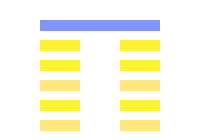
23.2.4.5.6 (23 > 47) - THE PO HEXAGRAM
- 2. The second line, divided, shows one overthrowing the couch by injuring its frame. (The injury will go on to) the destruction of (all) firm correctness, and there will be evil.
- 4. The fourth line, divided, shows its subject having overthrown the couch, and (going to injure) the skin (of him who lies on it). There will be evil.
- 5. The fifth line, divided, shows (its subject leading on the others like) a string of fishes, and (obtaining for them) the favour that lights on the inmates of the palace. There will be advantage in every way.
- 6. The topmost line, undivided, shows its subject (as) a great fruit which has not been eaten. The superior man finds (the people again) as a chariot carrying him. The small men (by their course) overthrow their own dwellings.
23.2.4.5.6 (23 > 47) - Avoiding cramming
One revises one's lessons without taking care of the subject that will be proposed.
Bing DeepL Google Yandex23.2.4.5.6 (23 > 47) - Avoiding cramming
One revises one's lessons without taking care of the subject that will be proposed.
Bing DeepL Google Yandex23.2.4.5.6 (23 > 47) - Poh, l’écroulement
Poh : opprimer, renverser, traiter durement.
-
2. [i]Id. (Poh)[i], renverser son lit en en brisant la forme ; ruine, issue destructive. C’est celui qui se perd lui-même en perdant ses auxiliaires ; un roi, ses ministres ; un grand, ses employés et amis. (Dicton.)
Il n’aura pas de compagnons.
C’est la ruine s’étendant, gagnant le haut. -
4. Renverser son lit en s’écorchant, en se nuisant à soi-même, destruction certaine, calamité proche.
Suite de la gradation, en renversant on se blesse -
5. Le prince généreux envers les gens du palais (litt.(/i] : qui enfile des poissons pour en faire présent), en retirera des avantages certains.
Peut-être devrait-on admettre déjà ici l’élément figuratif et symbolique, et voir dans l’hexagramme la figure du prince (ligne pleine supérieure) au-dessus de ses officiers rangés comme des poissons séchés et traduire : avoir des officiers comme des poissons enfilés. Alors, il s’agirait de [i]p’o, gens du palais. -
6. Fruit tout formé qu’on ne mange pas (bien acquis qui se détruit). Le sage, l’homme supérieur conquiert la terre (ou acquiert un char, le peuple qui le porte sur ses bras) ; l’homme bas et vulgaire fait crouler (poh) jusqu’à sa demeure (le fruit formé qu’il ne peut manger).
Il ne pourra plus en user.
23.2.4.5.6 (23 > 47) - Éviter le bachotage
On révise ses leçons sans prendre garde au sujet qui sera proposé.
Bing DeepL Google Yandex23.2.4.5.6 (23 > 47) - Lepusztulás
- 2. Támasz, amire nem lehet számítani többé.
- 4. Nem akar elviselni többé.
- 5. Látja mi nem működik.
- 6. Elfogadja a veszteséget. Támogatást és lehetőséget kap.
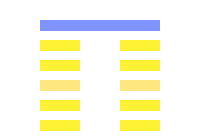
23.1.2.4.5.6 (23 > 58) - THE PO HEXAGRAM
- 1. The first line, divided, shows one overturning the couch by injuring its legs. (The injury will go on to) the destruction of (all) firm correctness, and there will be evil.
- 2. The second line, divided, shows one overthrowing the couch by injuring its frame. (The injury will go on to) the destruction of (all) firm correctness, and there will be evil.
- 4. The fourth line, divided, shows its subject having overthrown the couch, and (going to injure) the skin (of him who lies on it). There will be evil.
- 5. The fifth line, divided, shows (its subject leading on the others like) a string of fishes, and (obtaining for them) the favour that lights on the inmates of the palace. There will be advantage in every way.
- 6. The topmost line, undivided, shows its subject (as) a great fruit which has not been eaten. The superior man finds (the people again) as a chariot carrying him. The small men (by their course) overthrow their own dwellings.
23.1.2.4.5.6 (23 > 58) - Not giving in to leniency
One applies the law in all its severity to avoid being accused of being lax.
Bing DeepL Google Yandex23.1.2.4.5.6 (23 > 58) - Not giving in to leniency
One applies the law in all its severity to avoid being accused of being lax.
Bing DeepL Google Yandex23.1.2.4.5.6 (23 > 58) - Poh, l’écroulement
Poh : opprimer, renverser, traiter durement.
-
1. Poh, « renverser, faire crouler » son lit en en brisant un pied et le détachant ainsi (suites funestes).
C’est le grand, le prince qui se nuit à lui-même en appauvrissant, affaiblissant son peuple. -
2. [i]Id. (Poh)[i], renverser son lit en en brisant la forme ; ruine, issue destructive. C’est celui qui se perd lui-même en perdant ses auxiliaires ; un roi, ses ministres ; un grand, ses employés et amis. (Dicton.)
Il n’aura pas de compagnons.
C’est la ruine s’étendant, gagnant le haut. -
4. Renverser son lit en s’écorchant, en se nuisant à soi-même, destruction certaine, calamité proche.
Suite de la gradation, en renversant on se blesse -
5. Le prince généreux envers les gens du palais (litt.(/i] : qui enfile des poissons pour en faire présent), en retirera des avantages certains.
Peut-être devrait-on admettre déjà ici l’élément figuratif et symbolique, et voir dans l’hexagramme la figure du prince (ligne pleine supérieure) au-dessus de ses officiers rangés comme des poissons séchés et traduire : avoir des officiers comme des poissons enfilés. Alors, il s’agirait de [i]p’o, gens du palais. -
6. Fruit tout formé qu’on ne mange pas (bien acquis qui se détruit). Le sage, l’homme supérieur conquiert la terre (ou acquiert un char, le peuple qui le porte sur ses bras) ; l’homme bas et vulgaire fait crouler (poh) jusqu’à sa demeure (le fruit formé qu’il ne peut manger).
Il ne pourra plus en user.
23.1.2.4.5.6 (23 > 58) - Ne pas céder à l'indulgence
On applique la loi dans toute sa sévérité pour ne pas être accusé de laxisme.
Bing DeepL Google Yandex23.1.2.4.5.6 (23 > 58) - Lepusztulás
- 1. Nem látja mit veszít.
- 2. Támasz, amire nem lehet számítani többé.
- 4. Nem akar elviselni többé.
- 5. Látja mi nem működik.
- 6. Elfogadja a veszteséget. Támogatást és lehetőséget kap.
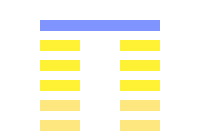
23.3.4.5.6 (23 > 31) - THE PO HEXAGRAM
- 3. The third line, divided, shows its subject among the overthrowers; but there will be no error.
- 4. The fourth line, divided, shows its subject having overthrown the couch, and (going to injure) the skin (of him who lies on it). There will be evil.
- 5. The fifth line, divided, shows (its subject leading on the others like) a string of fishes, and (obtaining for them) the favour that lights on the inmates of the palace. There will be advantage in every way.
- 6. The topmost line, undivided, shows its subject (as) a great fruit which has not been eaten. The superior man finds (the people again) as a chariot carrying him. The small men (by their course) overthrow their own dwellings.
23.3.4.5.6 (23 > 31) - Protecting oneself against nasty surprises
One returns to find out what the others have kept silent.
Bing DeepL Google Yandex23.3.4.5.6 (23 > 31) - Protecting oneself against nasty surprises
One returns to find out what the others have kept silent.
Bing DeepL Google Yandex23.3.4.5.6 (23 > 31) - Poh, l’écroulement
Poh : opprimer, renverser, traiter durement.
- 3. Renverser, faire crouler quelque chose sans suite regrettable. C’est quand on le fait légitimement et pour bonnes raisons. C’est que cela atteint également grands et petits (ou abandonne).
-
4. Renverser son lit en s’écorchant, en se nuisant à soi-même, destruction certaine, calamité proche.
Suite de la gradation, en renversant on se blesse -
5. Le prince généreux envers les gens du palais (litt.(/i] : qui enfile des poissons pour en faire présent), en retirera des avantages certains.
Peut-être devrait-on admettre déjà ici l’élément figuratif et symbolique, et voir dans l’hexagramme la figure du prince (ligne pleine supérieure) au-dessus de ses officiers rangés comme des poissons séchés et traduire : avoir des officiers comme des poissons enfilés. Alors, il s’agirait de [i]p’o, gens du palais. -
6. Fruit tout formé qu’on ne mange pas (bien acquis qui se détruit). Le sage, l’homme supérieur conquiert la terre (ou acquiert un char, le peuple qui le porte sur ses bras) ; l’homme bas et vulgaire fait crouler (poh) jusqu’à sa demeure (le fruit formé qu’il ne peut manger).
Il ne pourra plus en user.
23.3.4.5.6 (23 > 31) - Se prémunir contre les mauvaises surprises
On revient pour découvrir ce que les autres ont tu.
Bing DeepL Google Yandex23.3.4.5.6 (23 > 31) - Lepusztulás
- 3. Nem törődik a többiekkel többé.
- 4. Nem akar elviselni többé.
- 5. Látja mi nem működik.
- 6. Elfogadja a veszteséget. Támogatást és lehetőséget kap.
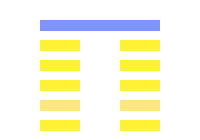
23.1.3.4.5.6 (23 > 49) - THE PO HEXAGRAM
- 1. The first line, divided, shows one overturning the couch by injuring its legs. (The injury will go on to) the destruction of (all) firm correctness, and there will be evil.
- 3. The third line, divided, shows its subject among the overthrowers; but there will be no error.
- 4. The fourth line, divided, shows its subject having overthrown the couch, and (going to injure) the skin (of him who lies on it). There will be evil.
- 5. The fifth line, divided, shows (its subject leading on the others like) a string of fishes, and (obtaining for them) the favour that lights on the inmates of the palace. There will be advantage in every way.
- 6. The topmost line, undivided, shows its subject (as) a great fruit which has not been eaten. The superior man finds (the people again) as a chariot carrying him. The small men (by their course) overthrow their own dwellings.
23.1.3.4.5.6 (23 > 49) - Becoming an accomplice
One is involved in a conspiracy that the others have hatched.
Bing DeepL Google Yandex23.1.3.4.5.6 (23 > 49) - Becoming an accomplice
One is involved in a conspiracy that the others have hatched.
Bing DeepL Google Yandex23.1.3.4.5.6 (23 > 49) - Poh, l’écroulement
Poh : opprimer, renverser, traiter durement.
-
1. Poh, « renverser, faire crouler » son lit en en brisant un pied et le détachant ainsi (suites funestes).
C’est le grand, le prince qui se nuit à lui-même en appauvrissant, affaiblissant son peuple. - 3. Renverser, faire crouler quelque chose sans suite regrettable. C’est quand on le fait légitimement et pour bonnes raisons. C’est que cela atteint également grands et petits (ou abandonne).
-
4. Renverser son lit en s’écorchant, en se nuisant à soi-même, destruction certaine, calamité proche.
Suite de la gradation, en renversant on se blesse -
5. Le prince généreux envers les gens du palais (litt.(/i] : qui enfile des poissons pour en faire présent), en retirera des avantages certains.
Peut-être devrait-on admettre déjà ici l’élément figuratif et symbolique, et voir dans l’hexagramme la figure du prince (ligne pleine supérieure) au-dessus de ses officiers rangés comme des poissons séchés et traduire : avoir des officiers comme des poissons enfilés. Alors, il s’agirait de [i]p’o, gens du palais. -
6. Fruit tout formé qu’on ne mange pas (bien acquis qui se détruit). Le sage, l’homme supérieur conquiert la terre (ou acquiert un char, le peuple qui le porte sur ses bras) ; l’homme bas et vulgaire fait crouler (poh) jusqu’à sa demeure (le fruit formé qu’il ne peut manger).
Il ne pourra plus en user.
23.1.3.4.5.6 (23 > 49) - Devenir complice
On trempe dans un complot que les autres ont ourdi.
Bing DeepL Google Yandex23.1.3.4.5.6 (23 > 49) - Lepusztulás
- 1. Nem látja mit veszít.
- 3. Nem törődik a többiekkel többé.
- 4. Nem akar elviselni többé.
- 5. Látja mi nem működik.
- 6. Elfogadja a veszteséget. Támogatást és lehetőséget kap.
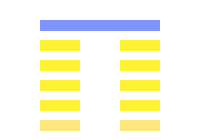
23.2.3.4.5.6 (23 > 28) - THE PO HEXAGRAM
- 2. The second line, divided, shows one overthrowing the couch by injuring its frame. (The injury will go on to) the destruction of (all) firm correctness, and there will be evil.
- 3. The third line, divided, shows its subject among the overthrowers; but there will be no error.
- 4. The fourth line, divided, shows its subject having overthrown the couch, and (going to injure) the skin (of him who lies on it). There will be evil.
- 5. The fifth line, divided, shows (its subject leading on the others like) a string of fishes, and (obtaining for them) the favour that lights on the inmates of the palace. There will be advantage in every way.
- 6. The topmost line, undivided, shows its subject (as) a great fruit which has not been eaten. The superior man finds (the people again) as a chariot carrying him. The small men (by their course) overthrow their own dwellings.
23.2.3.4.5.6 (23 > 28) - Faking benevolence
One likes to make others believe that they will have no trouble making themselves heard.
Bing DeepL Google Yandex23.2.3.4.5.6 (23 > 28) - Faking benevolence
One likes to make others believe that they will have no trouble making themselves heard.
Bing DeepL Google Yandex23.2.3.4.5.6 (23 > 28) - Poh, l’écroulement
Poh : opprimer, renverser, traiter durement.
-
2. [i]Id. (Poh)[i], renverser son lit en en brisant la forme ; ruine, issue destructive. C’est celui qui se perd lui-même en perdant ses auxiliaires ; un roi, ses ministres ; un grand, ses employés et amis. (Dicton.)
Il n’aura pas de compagnons.
C’est la ruine s’étendant, gagnant le haut. - 3. Renverser, faire crouler quelque chose sans suite regrettable. C’est quand on le fait légitimement et pour bonnes raisons. C’est que cela atteint également grands et petits (ou abandonne).
-
4. Renverser son lit en s’écorchant, en se nuisant à soi-même, destruction certaine, calamité proche.
Suite de la gradation, en renversant on se blesse -
5. Le prince généreux envers les gens du palais (litt.(/i] : qui enfile des poissons pour en faire présent), en retirera des avantages certains.
Peut-être devrait-on admettre déjà ici l’élément figuratif et symbolique, et voir dans l’hexagramme la figure du prince (ligne pleine supérieure) au-dessus de ses officiers rangés comme des poissons séchés et traduire : avoir des officiers comme des poissons enfilés. Alors, il s’agirait de [i]p’o, gens du palais. -
6. Fruit tout formé qu’on ne mange pas (bien acquis qui se détruit). Le sage, l’homme supérieur conquiert la terre (ou acquiert un char, le peuple qui le porte sur ses bras) ; l’homme bas et vulgaire fait crouler (poh) jusqu’à sa demeure (le fruit formé qu’il ne peut manger).
Il ne pourra plus en user.
23.2.3.4.5.6 (23 > 28) - Feindre la bienveillance
On se plaît à faire croire aux autres qu'ils n'auront aucun mal à se faire entendre.
Bing DeepL Google Yandex23.2.3.4.5.6 (23 > 28) - Lepusztulás
- 2. Támasz, amire nem lehet számítani többé.
- 3. Nem törődik a többiekkel többé.
- 4. Nem akar elviselni többé.
- 5. Látja mi nem működik.
- 6. Elfogadja a veszteséget. Támogatást és lehetőséget kap.
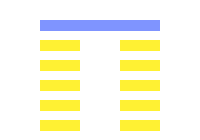
23.1.2.3.4.5.6 (23 > 43) - THE PO HEXAGRAM
- 1. The first line, divided, shows one overturning the couch by injuring its legs. (The injury will go on to) the destruction of (all) firm correctness, and there will be evil.
- 2. The second line, divided, shows one overthrowing the couch by injuring its frame. (The injury will go on to) the destruction of (all) firm correctness, and there will be evil.
- 3. The third line, divided, shows its subject among the overthrowers; but there will be no error.
- 4. The fourth line, divided, shows its subject having overthrown the couch, and (going to injure) the skin (of him who lies on it). There will be evil.
- 5. The fifth line, divided, shows (its subject leading on the others like) a string of fishes, and (obtaining for them) the favour that lights on the inmates of the palace. There will be advantage in every way.
- 6. The topmost line, undivided, shows its subject (as) a great fruit which has not been eaten. The superior man finds (the people again) as a chariot carrying him. The small men (by their course) overthrow their own dwellings.
23.1.2.3.4.5.6 (23 > 43) - Terrorizing one's subjects
One represses those who seek justice.
Bing DeepL Google Yandex23.1.2.3.4.5.6 (23 > 43) - Terrorizing one's subjects
One represses those who seek justice.
Bing DeepL Google Yandex23.1.2.3.4.5.6 (23 > 43) - Poh, l’écroulement
Poh : opprimer, renverser, traiter durement.
-
1. Poh, « renverser, faire crouler » son lit en en brisant un pied et le détachant ainsi (suites funestes).
C’est le grand, le prince qui se nuit à lui-même en appauvrissant, affaiblissant son peuple. -
2. [i]Id. (Poh)[i], renverser son lit en en brisant la forme ; ruine, issue destructive. C’est celui qui se perd lui-même en perdant ses auxiliaires ; un roi, ses ministres ; un grand, ses employés et amis. (Dicton.)
Il n’aura pas de compagnons.
C’est la ruine s’étendant, gagnant le haut. - 3. Renverser, faire crouler quelque chose sans suite regrettable. C’est quand on le fait légitimement et pour bonnes raisons. C’est que cela atteint également grands et petits (ou abandonne).
-
4. Renverser son lit en s’écorchant, en se nuisant à soi-même, destruction certaine, calamité proche.
Suite de la gradation, en renversant on se blesse -
5. Le prince généreux envers les gens du palais (litt.(/i] : qui enfile des poissons pour en faire présent), en retirera des avantages certains.
Peut-être devrait-on admettre déjà ici l’élément figuratif et symbolique, et voir dans l’hexagramme la figure du prince (ligne pleine supérieure) au-dessus de ses officiers rangés comme des poissons séchés et traduire : avoir des officiers comme des poissons enfilés. Alors, il s’agirait de [i]p’o, gens du palais. -
6. Fruit tout formé qu’on ne mange pas (bien acquis qui se détruit). Le sage, l’homme supérieur conquiert la terre (ou acquiert un char, le peuple qui le porte sur ses bras) ; l’homme bas et vulgaire fait crouler (poh) jusqu’à sa demeure (le fruit formé qu’il ne peut manger).
Il ne pourra plus en user.
23.1.2.3.4.5.6 (23 > 43) - Terroriser ses sujets
On réprime ceux qui demandent justice.
Bing DeepL Google Yandex23.1.2.3.4.5.6 (23 > 43) - Lepusztulás
- 1. Nem látja mit veszít.
- 2. Támasz, amire nem lehet számítani többé.
- 3. Nem törődik a többiekkel többé.
- 4. Nem akar elviselni többé.
- 5. Látja mi nem működik.
- 6. Elfogadja a veszteséget. Támogatást és lehetőséget kap.

